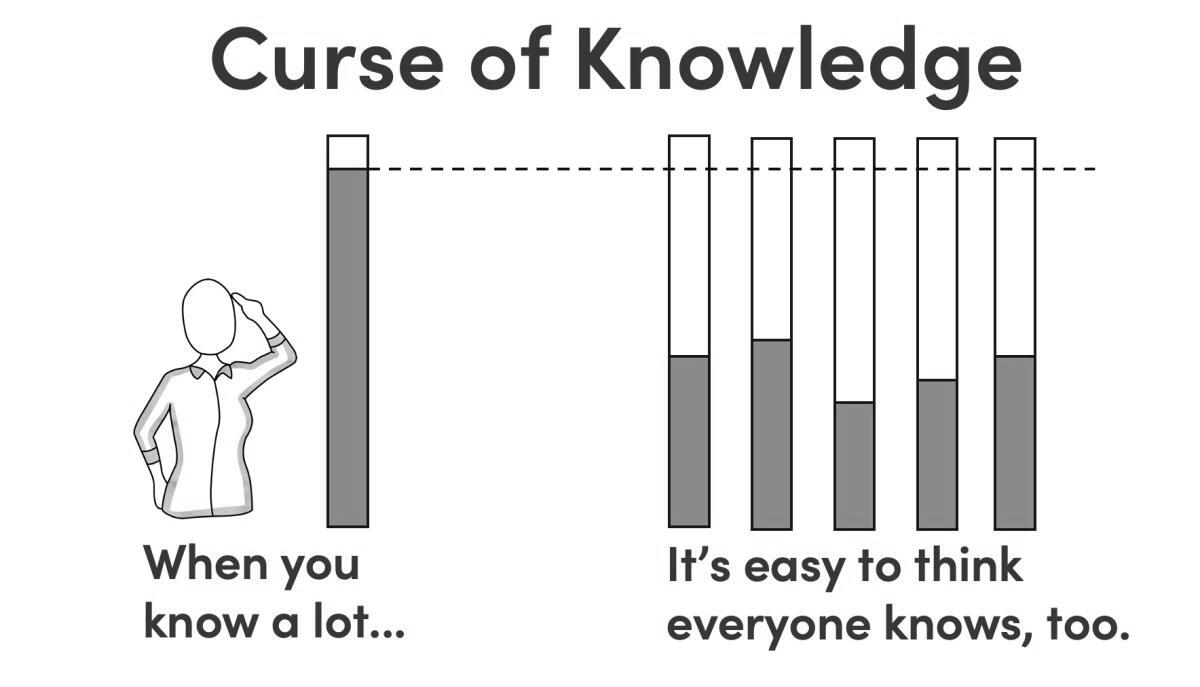Introduction
In the realm of decision-making, our expertise and knowledge can sometimes become a double-edged sword. The Curse of Knowledge is a mental model that highlights the difficulty experts face in communicating and understanding the perspective of novices due to the gap in knowledge. This blog post delves into the concept of the Curse of Knowledge, its relevance in decision-making processes, its anchoring in human psychology, and its prevalence in our day-to-day lives.
Defining the Curse of Knowledge
The Curse of Knowledge refers to the cognitive bias where individuals who possess a deep understanding of a subject struggle to recognize or communicate that knowledge to others who are less informed. It arises due to the inability to separate one’s own knowledge from the perspective of others, leading to misunderstandings and misjudgments in decision-making.
Relevance in Decision-Making
The Curse of Knowledge can significantly impact decision-making processes. Experts may underestimate the difficulty novices face in comprehending complex concepts, resulting in poor communication and misguided decisions. The failure to bridge the knowledge gap can lead to assumptions, overconfidence, and a lack of empathy towards those who lack the same level of expertise.
Examples of the Curse of Knowledge
- Personal Life Decisions: Imagine a medical professional trying to explain a diagnosis to a patient without considering their limited medical knowledge. The expert may unintentionally use jargon and complex terminology, assuming the patient will understand. This communication gap can lead to confusion, anxiety, and hinder the patient’s ability to make informed decisions about their health.
- Business Scenarios: In business, executives may develop strategies or make decisions based on their deep industry knowledge, assuming that others in the organization share the same level of understanding. This can result in misaligned expectations, poor communication, and hindered collaboration, leading to suboptimal outcomes for the company.
- Public Policy-Making: When policymakers possess expertise in a particular domain, they may struggle to consider the perspectives and needs of the general public. The policies they develop may not effectively address the concerns and realities of the wider population, ultimately resulting in decisions that are disconnected from the needs of the people they serve.
Mental Biases Contributing to the Curse of Knowledge
The Curse of Knowledge is intertwined with various cognitive biases, including the False Consensus Effect, Anchoring Bias, and the Halo Effect. The False Consensus Effect leads experts to overestimate the extent to which others share their knowledge or perspectives. Anchoring Bias can cause experts to rely too heavily on their own knowledge, overlooking alternative viewpoints. The Halo Effect can influence experts to assume that their expertise in one area automatically extends to other domains.
Psychological Underpinnings and Interplay
The Curse of Knowledge is rooted in the human tendency to rely on one’s own mental models and assume others possess the same level of understanding. Experts often forget what it was like to be a novice and struggle to separate their knowledge from their ability to explain it. The gap in perspective, coupled with the innate desire to be competent, contributes to the prevalence of the Curse of Knowledge in decision-making.
Identifying and Avoiding the Curse of Knowledge
- Seek Feedback and Validation: Regularly solicit feedback from others to gauge their understanding and perspective. Actively listen and validate their thoughts and concerns, acknowledging the knowledge gap. This practice helps uncover assumptions and biases, fostering better communication and decision-making.
- Use Plain Language and Analogies: When communicating with others, especially those with less expertise, strive to use plain language and relatable analogies to convey complex ideas. This approach helps bridge the knowledge gap and ensures a shared understanding of the topic at hand.
- Empathize with Novices: Cultivate empathy for those with less knowledge or experience. Put yourself in their shoes and consider their limitations and challenges. Empathy enhances communication, enables better understanding, and promotes more inclusive decision-making.
Implications of the Curse of Knowledge
The Curse of Knowledge can hinder effective communication, collaboration, and decision-making. By acknowledging its existence and actively working to mitigate its impact, individuals can foster better relationships, enhance their ability to communicate complex ideas, and make decisions that consider the diverse perspectives of others. Awareness and active avoidance of the Curse of Knowledge are essential for achieving more inclusive and effective decision-making processes.
Conclusion
The Curse of Knowledge is a pervasive cognitive bias that affects decision-making in various aspects of life. By understanding its definition, examples, and underlying biases, individuals can recognize when they fall prey to this bias. Through practical strategies such as seeking feedback, using plain language, and empathizing with others, the Curse of Knowledge can be overcome. Awareness and active avoidance of this mental trap contribute to more effective decision-making, fostering better communication, collaboration, and understanding across diverse domains and contexts.
